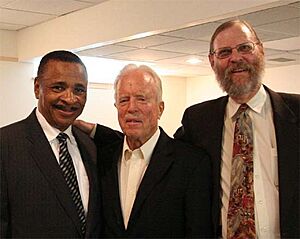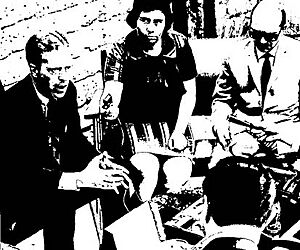Jack H. Vaughn facts for kids
Quick facts for kids
Jack Vaughn
|
|
|---|---|

Jack Vaughn, the second director of the Peace Corps, (center) with C. Payne Lucas, president emeritus of Africare, (left) on May 4, 2007
|
|
| United States Ambassador to Colombia | |
| In office June 9, 1969 – June 25, 1970 |
|
| President | Richard Nixon |
| Preceded by | Henry L. Taylor |
| Succeeded by | Leonard J. Saccio |
| 2nd Director of the Peace Corps | |
| In office March 1, 1966 – April 30, 1969 |
|
| President | Lyndon B. Johnson Richard Nixon |
| Preceded by | Sargent Shriver |
| Succeeded by | Joseph Blatchford |
| United States Ambassador to Panama | |
| In office May 6, 1964 – February 27, 1965 |
|
| President | Lyndon B. Johnson |
| Preceded by | Reynold E. Carlson |
| Succeeded by | Charles W. Adair, Jr. |
| Personal details | |
| Born |
Jack Hood Vaughn
August 18, 1920 Columbus, Montana, U.S. |
| Died | October 29, 2012 (aged 92) Tucson, Arizona, U.S. |
| Children | Jack Vaughn Jr. |
|
Jack H. Vaughn
|
|
|---|---|
| 11th Assistant Secretary of State for Inter-American Affairs | |
| In office March 22, 1965 – February 28, 1966 |
|
| Preceded by | Thomas C. Mann |
| Succeeded by | Lincoln Gordon |
Jack Hood Vaughn (August 18, 1920 – October 29, 2012) was an important American diplomat and public servant. He is best known as the second director of the Peace Corps, a program where American volunteers help people in other countries. President Lyndon Johnson appointed him to lead the Peace Corps in 1966. Jack Vaughn was also a United States Ambassador to Panama and Colombia.
Contents
Early Life and Education
Jack Vaughn was born in Columbus, Montana, in 1920. His father owned stores. In 1931, his family moved to Albion, Michigan. Jack graduated from Albion High School in 1939. He then earned a Bachelor of Arts degree from the University of Michigan in 1943.
Boxing Career
Jack Vaughn loved boxing from a young age. He even had a small gym in his father's building. By age 14, he was boxing publicly. He became a Golden Gloves champion three times. Sometimes, he would spar (practice fight) with famous boxers like Sugar Ray Robinson.
In 1942, Vaughn started fighting professionally in Mexico. He used the name "Johnny Hood." He fought 26 featherweight matches. Once, in Mexico, the crowd shouted "Mata al Gringo!" which means "Kill the American!" He thought they were cheering him on! This phrase later became the title of his unpublished book. While at the University of Michigan, he coached boxing and taught Spanish and French. He stopped professional boxing in 1948 after losing sight in one eye.
Marine Officer in World War II
During World War II, Jack Vaughn served as an officer in the United States Marine Corps. He was a rifle company commander and intelligence officer from 1942 to 1946. He fought in major battles like Eniwetok, Guam, and Okinawa. He left the Marines as a captain and earned the Purple Heart medal for being wounded.
After the war, Vaughn returned to the University of Michigan. He earned two master's degrees in 1947, one in Romance Languages and another in economics. He wanted to be a professor of French literature.
Working for the U.S. Government
Starting in Diplomacy
In 1949, Jack Vaughn joined the US Information Agency (USIA). He worked in Bolivia and Costa Rica. In 1951, he joined the State Department, which handles foreign relations. He spent five years in Panama. During the 1950s, he met with Che Guevara several times.
From 1959 to 1961, Vaughn worked for USAID (U.S. Agency for International Development). This agency helps other countries with development. He worked in Senegal, Mali, and Mauritania, focusing on agricultural improvements. His experience growing up on a ranch in Montana helped him in this role.
Joining the Peace Corps Staff
Jack Vaughn's journey with the Peace Corps began in 1961. The Peace Corps was a new program started by President John F. Kennedy. Its first director, Sargent Shriver, met Vaughn in Senegal. Shriver was impressed by Vaughn's boxing background and courage.
Vaughn was excited about the Peace Corps' mission. He became the Latin-American director of the Peace Corps from 1961 to 1964. When he started, there were only 78 volunteers in Latin America. By the time he left, there were 2,500 volunteers helping with rural and urban development. He helped send volunteers to Venezuela in 1963, even when it was risky.
Ambassador to Panama
In 1964, President Johnson appointed Vaughn as the U.S. Ambassador to Panama. This happened after protests and a break in relations between the two countries. Panamanians welcomed Vaughn because they knew him from his previous work. He had helped about 1,000 young Panamanians study in the United States.
Vaughn worked hard to improve relations and discuss the Panama Canal. He tried to convince the U.S. government to make new agreements. This was difficult because the Vietnam War was happening. However, his efforts paved the way for future talks about the Panama Canal Treaty.
Assistant Secretary of State
In 1965, President Johnson named Vaughn Assistant Secretary of State for Inter-American Affairs. This meant he was in charge of relations with many countries in Latin America and the Caribbean. He also led the Alliance for Progress, a program to help these countries develop.
Vaughn believed in a "Peace Corps-style" approach to diplomacy. He thought foreign service officers should spend time working with people, like Peace Corps volunteers do. He traveled to Latin America and reported that the Alliance for Progress was making good progress.
Leading the Peace Corps
When Sargent Shriver left the Peace Corps to lead the "War on Poverty," Jack Vaughn was chosen as the new director in 1966. President Johnson called him directly to offer the job. Vaughn was thrilled, saying it was "pure joy" to lead the Peace Corps.
Starting as Director
Vaughn was sworn in as Peace Corps director on March 1, 1966. This was the fifth anniversary of the Peace Corps. President Johnson praised Vaughn's dedication to peace. As his first task, Vaughn visited Peace Corps programs worldwide. He also personally met and shook hands with every employee at the Peace Corps Headquarters.
Focus on the Environment
One of Vaughn's most important contributions was shifting the Peace Corps' focus to environmental issues. He was inspired by a volunteer in Chile who planted 900,000 trees. Vaughn realized that volunteers, even without much technical training, could do amazing work in conservation. They could plant trees, clean streams, and help turn wasteland into forests.
Addressing Challenges in Nigeria
In 1966, Vaughn traveled to Nigeria to investigate complaints from Peace Corps Volunteers. Some volunteers were concerned about their living allowances and working conditions. Vaughn met with about 600 volunteers. He told them to focus on their work and live like the local people. He believed that busy volunteers were happy volunteers. This trip helped him understand the need to improve Peace Corps programs.
Improving Programs
Vaughn worked hard to make Peace Corps programs more professional. He created an Office of Planning and Program Review. He focused on what volunteers were doing and how well they were doing it, rather than just how many volunteers there were. This made the Peace Corps more efficient and effective.
Peace Corps and the Vietnam War
During the Vietnam War, many young people, including some volunteers, disagreed with U.S. policy. Vaughn defended the volunteers' right to express their opinions. He stated that Peace Corps volunteers were not part of U.S. foreign policy. However, there were rules about how volunteers could express political views overseas.
The anti-war feelings led to fewer people applying for the Peace Corps. Vaughn noted that many young people felt the U.S. should focus on its own problems at home first.
Peace Corps and the Draft
As a former Marine officer, Vaughn actively sought to protect Peace Corps volunteers from the military draft. He argued that pulling a volunteer from their work mid-tour was unfair. While Peace Corps service didn't automatically exempt someone from the draft, some draft boards granted deferments. Vaughn worked to appeal for volunteers who were called for induction.
Support Across Parties
Jack Vaughn was a Republican appointed by a Democratic president. This showed that the Peace Corps had strong support from both political parties. He even convinced Republican Senator Barry Goldwater, a conservative leader, that the Peace Corps represented important American values.
Ambassador to Colombia
When Richard Nixon became president in 1969, Vaughn was replaced as Peace Corps director. However, because he was a Republican, Nixon asked him to become the Ambassador to Colombia.
Vaughn served as Ambassador to Colombia from 1969 to 1970. He saw his role as a "goodwill ambassador." He worked to make the United States look good in Colombia. For example, as a former boxer, he refereed boxing matches in the Colombian National amateur championships. He was the only U.S. diplomat to referee a fight while serving as an Ambassador!
Vaughn resigned in 1970 to return to private life.
After Government Service
Continuing Support for the Peace Corps
Even after leaving government, Jack Vaughn remained a strong supporter of the Peace Corps. In 2008, he wrote an article in the Tucson Citizen newspaper. He argued that the Peace Corps' goals were still very important. He believed the Peace Corps helped with things like health care, environmental protection, and improving America's image abroad.
Personal Life
Jack Vaughn's first marriage ended in divorce. He married Margaret Anne Weld in 1970. Margaret had been a Peace Corps Volunteer herself. Jack had two daughters from his first marriage, Kathryn and Carol. He had a son, Jack Hood Vaughn Jr., and another daughter, Jane, with his second wife.
In 1992, Vaughn and his wife moved to Tucson, Arizona. Even at 87, he stayed active by shadow boxing. He joked that he pretended to hit certain politicians!
His son, Jack Vaughn Jr., became a successful record producer. He runs his own label and heads Comedy Central's record label. The younger Jack Vaughn lived in Guatemala during his father's diplomatic career, which he called a "terrific cultural experience."
Jack Vaughn passed away at his home in Tucson on October 29, 2012, at the age of 92, after battling cancer.
|
 | Victor J. Glover |
 | Yvonne Cagle |
 | Jeanette Epps |
 | Bernard A. Harris Jr. |


